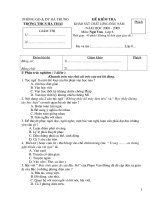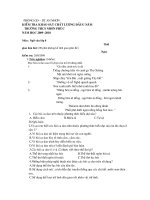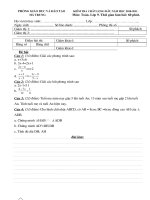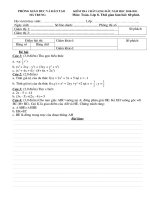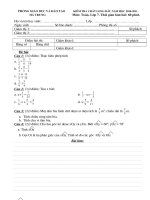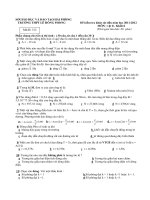ĐỀ KIỂM TRA CHẤT LƯỢNG ĐẦU NĂM TRƯỜNG THPT ĐATEH NĂM HỌC 2010 -2011 docx
Bạn đang xem bản rút gọn của tài liệu. Xem và tải ngay bản đầy đủ của tài liệu tại đây (100.21 KB, 2 trang )
- 1 -
SỞ GIÁO DỤC & ĐÀO TẠO LÂM ĐỒNG ĐỀ KIỂM TRA CHẤT LƯỢNG ĐẦU NĂM
TRƯỜNG THPT ĐATEH NĂM HỌC 2010 -2011
TỔ: ANH VĂN MÔN: TIẾNG ANH – LỚP 12
Thời gian :45 phút (không kể thời gian phát đề)
Họ và tên thí sinh: ……………………………………… Lớp: 12A………. CODE: 121
Số báo danh: ………………… ………. Phòng thi: ………….……………
I. Choose one word whose underlined part is pronounced differently by circling the corresponding letter A, B, C, or D
(1pt)
1. A. secure B. mutual C. structure D. humour
2. A. household B. biologist C. conical D. apologize
3. A. enjoyed B. escaped C. talked D. missed
4. A. likes B. dates C. loves D. roofs
II. Circle one underlined word or phrase (A, B, C or D) that must be changed in order for the sentence to be correct
(1pt)
5. Last summer, I went to stay with my uncle on his farm, which a lot of cattle are raised.
A B C D
6. She says she will find a good publisher after she had finished her new novel.
A B C D
7. She has worked as a secretary when she graduated from college.
A B C D
8. It would have been better if you wouldn’t have argued with him last night.
A B C D
III. Rewrite the following sentences so that the meaning stays the same. (1.5pt)
9. If she doesn’t work harder, she’ll lose her job.
Unless she works harder, she’ll lose her job.
10. He didn’t hurry, so he missed the train.
If he had hurried, he wouldn’t have missed the train.
11. Although he was poor, he studied well.
Despite his poverty, he studies well. / Despite the fact that he was poor, he studied well.
12. He received a low mark for his essay. It was only one page long. (Relative clause)
He received a low mark for his essay, which was only one page long.
13. I found a man’s wallet. He gave me a reward. (Relative clause)
The man whose wallet I found gave me a reward.
14. The last time I met Lan was in 1999.
I haven’t met Lan since 1999.
IV. Give the correct form of the word given in brackets: (1pt)
15. My mother takes the…responsibility……………………for running the household. (responsible)
16. A happy…………marriage………….………should be based on love. (marry)
17. I hope you haven’t been up to any………mischief……………while I was away. (mischievous)
18. The judge’s…………decision……….…………was to award damages to the defendant. (decide)
V. Choose the word or phrase -A, B, C or D-that best completes the sentences:( 1.5pt)
19. Jim, why don’t you take some time off? You …………… too hard lately.
A. have been working B. work C. worked D. are working
20. On the wedding day, the groom’s family brings trays of gifts…… in red paper to the bride’s home.
A. wrap B. wrapped C. to wrap D. wrapping
21. Housework has………………been regarded as women’s work.
A. tradition B. traditions C. traditional D. traditionally
22. Vietnam and Laos have always……………… close relationship.
A. objected B. conserved C. maintained D. safeguarded
23. It is important to have someone you can confide…………
A. of B. in C. with D. for
24. Nobody likes him because he behaves badly.
A. Nobody likes him because of he behaves badly. B. He behaves badly but nobody likes him.
C. Nobody likes him because of his bad behaviour. D. Nobody likes him because of his behaviour badly.
VI. Choose the suitable word to complete the following paragraph: (1.25 pt)
MARK
- 2 -
A dad is the person whom you ask for (25)………. money. He is the one who (26)………. about the time
you spend talking on the phone, as he has to pay for the bills. Dad is someone who will support you in an
(27)……………., if he believes you to be right. He is someone who reads your school report and treats if it is
good. A dad likes to come into a nice happy home evening, and settle (28)…………… in his chair with a
newspaper. He likes to (29) …… his National Service days.
25. A. pocket B. spending C. expense D. account
26. A. explains B. shouts C. complains D. groans
27. A. talk B. discussion C. disagreement D. argument
28. A. down B. back C. on D. for
29. A. remind B. realise C. recognize D. recall
VII. Read the passage carefully, then choose the correct answer. (1.25pt)
These days, most people in Britain and the US do not wear very formal clothes. But sometimes it is
important to wear the right thing.
Many British people don't think about clothes very much. They just like to be comfortable. When they go
out to enjoy themselves, they can wear almost anything. At theatres, cinemas and concerts you can put on what
you like from elegant suits and dresses to jeans and sweaters. Anything goes, as long as you look clean and
tidy.
But in Britain, as well as the US, men in offices usually wear suits and ties, and women wear dresses or
skirts (not trousers). Doctors, lawyers and business people wear quite formal clothes. And in some hotels and
restaurants men have to wear ties and women wear smart dresses.
In many years, Americans are more relaxed than British people, but they are more careful with their
clothes. At home, or on holiday, most Americans wear informal or sporty clothes. But when they go out in the
evening, they like to look elegant. In good hotels and restaurants, men have to wear jackets and ties, and
women wear pretty clothes and smart hairstyles.
It is difficult to say exactly what people wear informal or formal in Britain and the US, because everyone
is different. If you are not sure what to wear, watch what other people do and then do the same. You'll feel more
relaxed if you don't look too different from everyone else.
30. Many British people wear freely when they…………
A. attend meetings B. attend lectures C. spend their spare time D. meet their friends
31. Who doesn't usually wear suits and ties?
A. Lawyers B. Doctors C. Drivers D. Accountants
32. If you visit an American friend at home in the evening, you may find that your friend wears …………
A. pretty clothes B. informal clothes C. formal clothes D. plain clothes
33. If you are in a foreign country, the best way the writer suggests to you is to wear………
A. strange clothes B. as the people there do C. your native clothes . D. comfortable clothes
34. What do you think the passage is mainly about?
A. Recent dressing habit in Great Britain and the United States.
B. The reason why informal clothing is popular in the UK and USA.
C. When we should wear in a formal way.
D. Where we should wear in a formal way.
VIII. LISTENING: * Listen to the conversation between Paul and Andrea and then choose the best answer: (1pt)
35. When is Andrea leaving for her home?
A. tomorrow B. tomorrow morning C. next month D. tomorrow afternoon
36. Paul’s home is about……………………. from where he is now.
A. 118 B. 108 C. 180 D. 810
37. How does Paul often go home?
A. by train B. by coach C. by plane D. A & B
38. How many children are there in Andrea’s family?
A. 3 B. 6 C. 7 D. 8
* Listen again and answer the questions below: (0.5pt)
39. Why isn’t Paul excited about going home?
Because his family aren’t very close-knit.
40. Where do Andrea’s family have dinner when they get together?
They often go out for dinner.
The end.
